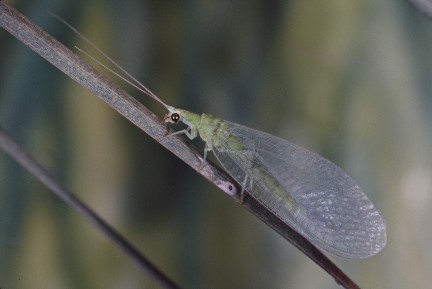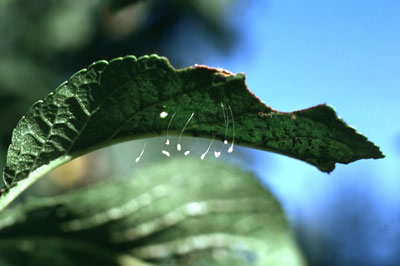

LACEWINGS AND ANTLIONS (NEUROPTERA) OF BRITISH COLUMBIA

Chrysopa nigricornis, photo by M.B. Cooke & R.A. Cannings
by
R. A. Cannings and G. G. E. Scudder
Copyright © 2007 - All rights reserved
Extracted from the forthcoming publication The Insect Families of British Columbia
Introduction (draft only)
Small to medium sized insects, 2 to 120 mm long. Body form and appearance quite varied. Head prognathous with mandibulate mouthparts. Lacking ocelli in families in British Columbia. Prothorax usually short, and shorter than combined length of the mesothorax and metathorax. If prothorax long, then forelegs raptorial. Forewings and hindwings membranous, equal or subequal in size and narrowed at base, and held roof-like over the abdomen when at rest. Venation, if not reduced, with main longitudinal veins branched at wing margins, and wings with many cross-veins. If venation reduced, then insects either covered with a whitish powder (Aleyrodidae) or with an elongate pronotum and raptorial forelegs (Mantispidae). Legs usually cursorial, except in Mantispidae. Abdomen without cerci, and usually without a long ovipositor in the female (except in the Mantispidae).
Adults are primarily, but not exclusively crepuscular or nocturnal. They may have complex courtship and mating rituals.
Larvae are predaceous, usually with piercing and sucking mouthparts. Most spin silken cocoons.
Worldwide there are some 17 families of Neuropera, eight of which occur in British Columbia.

Stalked eggs of
Chrysopidae (Neuroptera) (Green Lacewings). ID by Rob Cannings. Photo by David Shackleton.
Note:
This write up is extracted from the forthcoming publication by Scudder and Cannings: the Insect Families of British Columbia.
Illustrations by L. L. Lucas. Copyright © 2005 - All rights reserved
Please cite these pages as:
Author, date, page title. In: Klinkenberg, Brian. (Editor) 2023. E-Fauna BC: Electronic Atlas of the Fauna of British Columbia [www.efauna.bc.ca]. Department of Geography, University of British Columbia, Vancouver. [Date Accessed]
© Copyright 2023 E-Fauna BC.